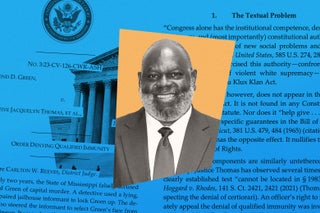 excerpts from his opinion, and the Supreme Court building." width="1560" height="1040" />
excerpts from his opinion, and the Supreme Court building." width="1560" height="1040" /> excerpts from his opinion, and the Supreme Court building." width="1560" height="1040" />
excerpts from his opinion, and the Supreme Court building." width="1560" height="1040" />
It takes a lot of courage for a lower court judge to criticize the Supreme Court, but Judge Carlton Reeves has long felt a responsibility to speak candidly to the public about threats to their civil rights. In an opinion on Monday, he calls for the abolition of qualified immunity—a noxious legal doctrine that insulates violent and corrupt government officials, especially law enforcement, from accountability. He embedded this call to action in a broader critique of the Supreme Court’s selective application of precedent—with a focus on the cavalier reversal of Roe v. Wade—as well as its pernicious distrust of democracy. Reeves’ opinion warns all who wish to listen that a broad array of our constitutional liberties are in serious and imminent jeopardy.
AdvertisementA Barack Obama appointee, Reeves sits on a U.S. District Court in Mississippi. His latest opinion was sparked by facts that he sees all too often and has written about before: the egregious violation of a criminal suspect’s constitutional rights as an innocent person wrongly charged with a crime. It began when detective Jacquelyn Thomas of Jackson, Mississippi, accused Desmond Green of murder. The detective’s only evidence was a statement made by Green’s acquaintance, Samuel Jennings—after Jennings was arrested for burglary and grand larceny, and while he was under the influence of meth. Thomas allegedly encouraged Jennings to select Green’s picture out of a photo lineup after he identified someone else as the killer. Allegedly, she also misled the grand jury to secure an indictment, concealing Jennings’ drug abuse as well as the many inconsistencies and inaccuracies in his statement.
Jennings later recanted, admitting that, in his meth-addled state, he’d provided a bogus tip. A judge finally dismissed the charges. By that point, Green had spent 22 months in jail, serving pretrial detention. The facility was violent. The food was moldy. He slept on the floor. His cell was infested with snakes and vermin. Green then sued Thomas, accusing her of malicious prosecution in violation of the Constitution. Thomas promptly asserted qualified immunity to defeat the lawsuit. This doctrine protects government officials from liability unless they run afoul of “clearly established” law. In other words, there must be an earlier case on the books with similar, “particularized” facts that explicitly bars the official’s actions. If there is no near-identical precedent that unambiguously prohibits those acts, qualified immunity kicks in, the lawsuit is tossed out, and the case never even reaches a jury.